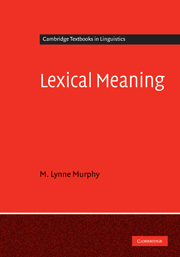Book contents
- Frontmatter
- Contents
- List of figures
- Preface: using this book
- Acknowledgments
- Typographical conventions
- Part I Meaning and the lexicon
- 1 The lexicon – some preliminaries
- 2 What do we mean by meaning?
- 3 Components and prototypes
- 4 Modern componential approaches – and some alternatives
- Part II Relations among words and senses
- Part III Word classes and semantic types
- References
- Index
4 - Modern componential approaches – and some alternatives
from Part I - Meaning and the lexicon
Published online by Cambridge University Press: 05 June 2012
- Frontmatter
- Contents
- List of figures
- Preface: using this book
- Acknowledgments
- Typographical conventions
- Part I Meaning and the lexicon
- 1 The lexicon – some preliminaries
- 2 What do we mean by meaning?
- 3 Components and prototypes
- 4 Modern componential approaches – and some alternatives
- Part II Relations among words and senses
- Part III Word classes and semantic types
- References
- Index
Summary
Key words:
conceptual semantics, (lexical) concept, generative lexicon, qualia, natural semantic metalanguage, semantic prime, explication
Overview and questions
While the Classical-style componential approaches of the last chapter were too inflexible to account for fuzzy meaning, various current componential approaches have broken down the traditional barrier between lexical and conceptual representations of meaning, thus confronting more directly the relation between linguistic semantics and general cognition, as well as interfacing with current theories of grammatical structure. This chapter gives overviews of three componential approaches: Jackendoff's Conceptual Semantics, Pustejovsky's Generative Lexicon, and Wierzbicka's Natural Semantic Metalanguage. Particular applications of these approaches are discussed in more detail in later chapters. The purpose of this chapter is to draw out the main motivations of these approaches and their chief similarities and differences. After looking at these componential approaches, we briefly consider two non-componential alternatives: meaning atomism and image schemas.
- Type
- Chapter
- Information
- Lexical Meaning , pp. 58 - 80Publisher: Cambridge University PressPrint publication year: 2010

